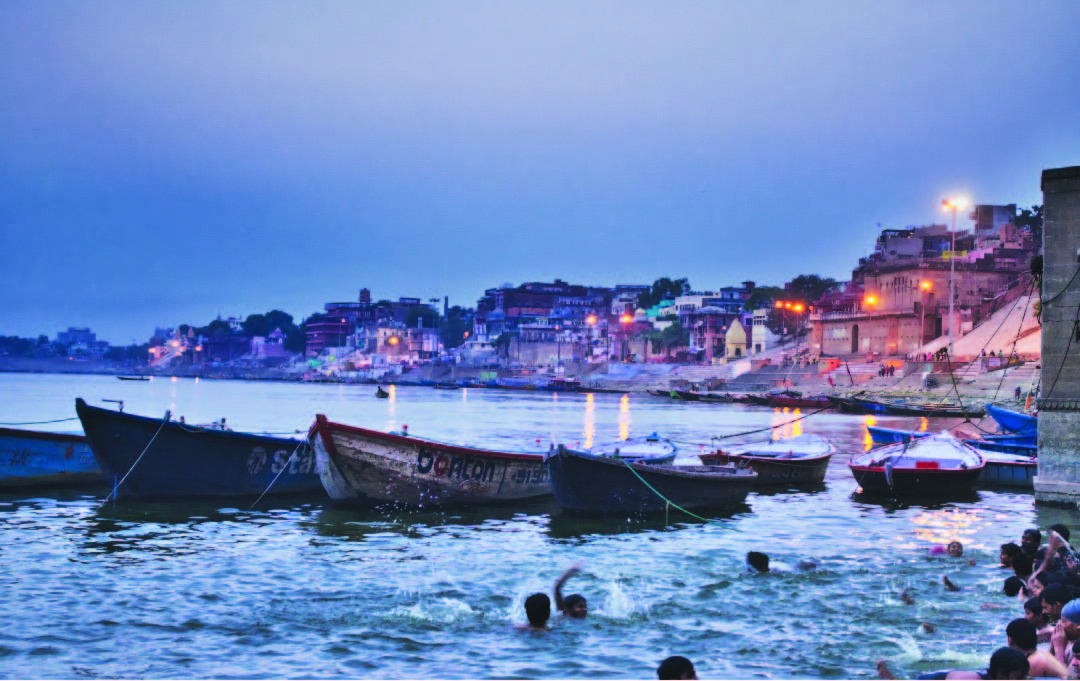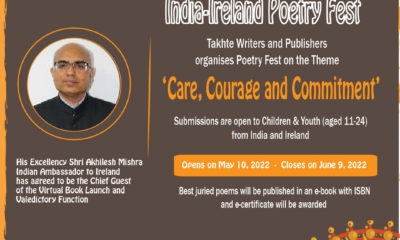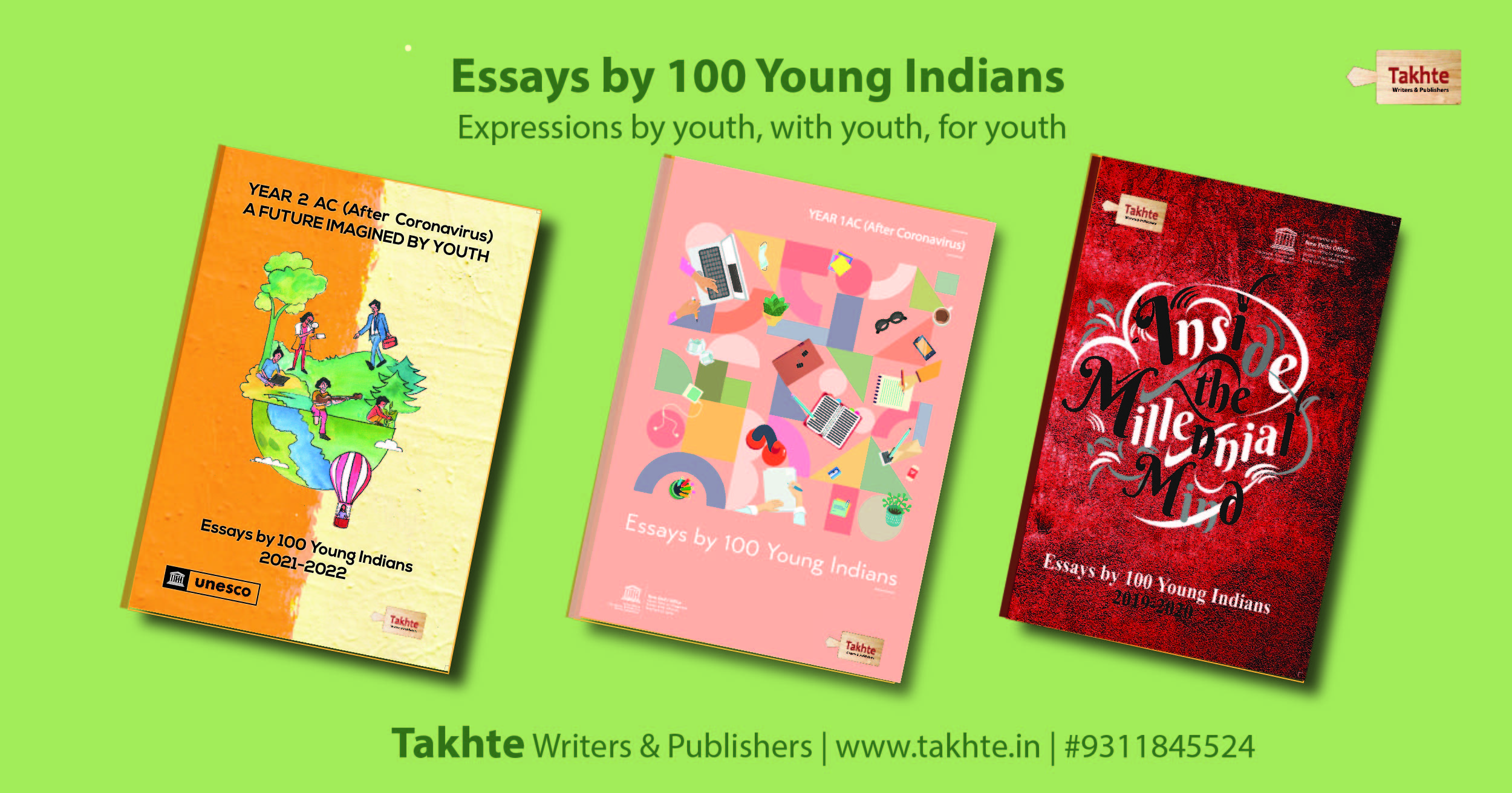Simply Express
The Free-Hearted Cameraman

Chaitanyamoi Chetia
St. Joseph’s High School, Moranhat
It was the best time to go for an elephant safari on a jeep for the tourists. Joy and his parents had already set out in the early morning, and their destination was at the Kaziranga National Park. All the resorts located there were beautiful to look at, but Joy’s father preferred the alternatives recommended by the Assam Tourism Development Corporation. After much effort, Joy’s father had been able to book one double-bedded room having a balcony and that also many weeks before Joy’s annual examination started.
His mother packed all the necessary and requisites for their stay there. She had been giving a strict vigil to the wrapped things like the mobile phone and the charger because it was their only camera mobile through which they would capture pictures; warm clothes and his father’s medicines prescribed by the doctor were also packed.
His parents’ curiosity for purchasing one new camera abated from their mind when they had lost a steady SLR camera at a children park due to their negligence when Joy had been a small boy.
They checked in at the reception desk and signed in their names in the book. Joy took his bath and changed his casual attires, and started enjoying cartoon films on the mobile.
His mother said, “The battery life of a mobile is not a day’s worth. Get it fully charged; instead of the mobile, you can enjoy the TV while reclining on a chair.”
Joy answered, “I will keep only after watching five minutes, Mother.”
They took their lunch at the banquet hall of the resort and came out: the manager of the resort was a nice man who told that the landscape of the Bagori range at the Kaziranga National Park spreads in the western range of the wild forest and also considered the best zone for wildlife sighting. In fact, the manager suggested that they should prefer that range.
Joy’s parents took the mobile phones without wasting any time, and Joy took a mineral water bottle and headed for the jeep safari. Innumerable tourists with different types and sizes of cameras were seen walking here and there with smiles on their face near the booking counter organised by the forest officials; some children of Joy’s age were also seen hopping and jumping in joy. In an open hooded jeep, they took their seat, and the jeep drove towards the Bagori range, and it stopped for a while at the security checkpoint. Many jeeps were parked there, and tourists from different parts of the globe were wandering and taking photos near the timber plank standing straight and on the plank written – KAZIRANGA.
Joy and his parents got down to click photos, and Joy’s parents were looking cheerful. “Joy, take us a photo near this timber plank,” said his father.
Joy struggled a great many times to click a photo, but every time he attempted, he failed. Then came his mother and tried through her mobile and the same thing happened.
“Alas! what will happen now,” Joy wandered.
His mother said desperately, “Joy, arriving here, I warned you to give a wide berth to mobile, but you didn’t pay heed to my saying. Now, we failed to click even a single photo for a lifetime memory. Now what on earth are you going to do!”
Joy felt like he was between Scylla and Charybdis, for the camera mobile had failed. Just then, he approached a tourist who had a camera in his hand.
“Uncle, you are looking wonderful with your Van Dyke style beard,” said Joy. “Would you kindly take a photo for us?”
With the camera in his hand, the man said, “Of course, take your position and tell your parents to come; after clicking, I shall transfer it to your mobile.”
“The man’s photographic etiquette suggests he must be a professional photographer,” Joy’s mother told his father. “Also, look at his white beard and the blue denim attires he is putting on.”
“A full goatee with detached moustache and his facial feature highlights he is from a foreign country,” his father said.
The Van Dyke style white beard man also wondered himself, “This boy’s eagerness for photography shows he is an aspiring photographer, though he has no camera in his hand.”
The security guards in uniform checked the booking tickets of the tourists. Barring cameras and mobile phones, edible things and water bottle were not allowed to take inside. Slowly one by one, all the registered tourist jeeps went inside the dense jungle.
Joy saw from a close range the water buffaloes and one-horned rhinoceros everywhere and a herd of deer and wild elephants and many migratory birds.
Joy’s father inquired, “What was the problem with the mobile phone that we could not click a single photo?”
Joy’s mother answered, “I asked Joy to limit himself in enjoying the mobile phone and be careful so that the battery charge does not hit zero; Joy did not listen.”
His father took the matter lightly and said, “Our destination choice was a nice one. There was a great feeling of camaraderie and togetherness which developed in the tourist spot.”
His father again added, “Look at the wet alluvial tall grassland fringed with tall reeds and the beautiful one-horned rhinoceros.”
While Joy was watching the rhinoceros grazing and wallowing, he was in jubilation and excessive joy when he saw a few security vehicles escorting British Royal couple, Prince William and Princess Kate Middleton, the Duke and Duchess of Cambridge visiting the Kaziranga National Park at the Bagori range in an open jeep. Joy couldn’t believe his eyes; he felt like he was looking at the Taj Mahal.
The sun had set, and they arrived at their resort. Joy saw some of the boys at the tourist spot playing and rejoicing in the ground under the bright halogen lights. On the room’s balcony, reclining on a chair, Joy’s mother was conversing with somebody through her mobile phone. She told Joy to go down below to the ground and play and get himself acquainted with them, for the next day after the elephant safari, they would check out. Joy was sad and remorseful that no pictures could be clicked through the mobile.
“Mother, I am reluctant to go down,” he said. Now I must get the battery charged to the full so that no obstacle creeps up tomorrow in the elephant safari when my father would try to capture any picture.”
Just then, a concierge of the resort came to the room to give the message that the next day morning, they would have to arrive at the Kohora range for the elephant safari. When asked about the time, the concierge replied to arrive early in the morning: and were told that the Kohora range would be about a few kilometres from the resort.
He continued, “There would be dense fog outside in the morning, so it would be better if you carry warm clothes with you.”
In the morning, Joy and his parents set out for the elephant safari. Joy handed over the mobile phone to his father so that when necessary, his father could click pictures. There was fog everywhere.
Joy said, “Father, for me, it is a different experience.”
With the mobile battery fully charged, Joy’s father clicked a sleeping fawn who was fast asleep; the fawn awoke and ran away immediately; the fawn’s amazing scene made everybody laugh and while running away even the dead fallen leaves and the twigs made a sound.
Joy shouted in ecstasy, pointing to the fawn, “Run, run.”
Joy’s father captured many photos of this fawn. Sitting on the elephant and taking photos made Joy’s father jubilant.
Joy said to himself, “My father is feeling so happy now; he captured without any difficulties many animals from different angles.”
Joy’s mother said, “We should be thankful to the mahout (the elephant rider who controls the elephant), because the latter had made the elephant move by the side of the sleeping fawn.”
They returned to the resort. They had breakfast, and Joy’s father took the prescribed medicine which was wrapped in a small paper. The receptionist and all other members there requested them to visit again. Joy and his parents got into their car. While coming out of the tourist gate, Joy again saw many new tourists congregating at the booking office and engrossed in talking with one another. Most of them were moving everywhere with different types of cameras in their hands.
One tourist approached a man, shook hands, and said, “What camera are you carrying in your arms?”
The man answered, “This is a DSLR camera.”
One lady came to one woman and said, looking at the camera, “This camera is looking nice; what camera is this!”
She answered, “Oh! This is a mirrorless camera.”
Joy looked at his father’s face and he could understand his father was feeling elated.
Joy said to himself, “I want to see my father in this way in a smiling face always. I pledge that I shall never again disturb my father’s mobile phone anymore. The photos that father captured during the elephant safari shall always remain a great memory for my parents as well as to me.”
His mother joyfully said, “Incredible!” looking at the photos transferred from the camera clicked near the timber plank by the white beard man to her mobile phone.
Simply Express
The pool in my backyard

Avni Singh
Podar World School Sama, Vadodara
My dad’s ever-changing job made us live almost everywhere except in India, our home country. We visited our extended family in India during the holidays, especially Varanasi, my hometown; they took us to the great river, the Ganges. The very first time when I travelled to the ghats (the steps leading to the river), I was excited to behold a spectacular sight of the river that takes away our sins with it. The Ganges, thronged by people from all corners of the subcontinent, serve as a water source for hundreds of villages and cities. I had heard several stories of the holy river from my grandparents. My cousins often bathed in it like a pool in our backyard.
I was utterly stunned and saddened to see the sight of the river. It was bursting with plastic bottles, flowers, polythene packets, and things I possibly could not describe. We returned without touching the water. Distraught with the thought of how a river considered holy, to be in such a state? I imagined that no one had tried to clean it up. Researching on it I found that Ganga Action Plan (GAP), launched in 1986, had tried cleaning it but did not achieve its high goals of preventing industries and sewage lines from polluting the river. So, during our visits in the later years, we just visited the Ganga as a ritual. I learned from my parents that the government had launched the Namami Gange program in 2014 to clean the river, and I hoped it would succeed.
The COVID-19 pandemic brought us back to India in 2020. Our relatives said that the Ganges looked cleaner as most industries were closed during the lockdown. There was a buzz in town that though COVID-19 made us suffer, it cleaned the river naturally. The river certainly looked clean from the outside. However, I had my doubts. So, I surfed online and came across reports of NGOs that work for cleaning the Ganges. They conduct water quality tests often and the recent results were shocking. The main reason for the pollution is untreated sewage water disposal into the river. The industrial wastes, leftovers due to religious activities, and land pollution runoff into the river add to the low water quality. Thus the river is not wholly cleaned. I am not proud of having a pool in my backyard but ashamed of not making any efforts to clean the great river that gives lives to millions of living beings.
Well, logically, after reading about the faecal material in the water, I had no intention of going into it. However, when we made a trip to the ghat this time, everyone except me was inside the water. As I watched, a man got in the knee-deep water and spit out a huge mouthful of well-chewed tobacco. My family watched this and rushed out of the water, not minding the cold at all. Then, he brushed his teeth and gargled in the same water. Finally, he bathed in it and worshipped the same river, which he polluted a few minutes earlier. We should all join hands and contribute to cleaning the river and the minds of the people who worship it but do not respect its sanctity.
( Photo by Shiv Prasad on Unsplash)
Simply Express
Shortened up Life

Sayanee Mukherjee
Handique Girls College, Guwahati, Assam
A cold morning with rains dripping and the birds chirping sweetly, what a beautiful start to the day.
My son and daughter were playing, so I decided to get a coffee and start my day. I switched on the portable music player and hoped to hear some melodies when suddenly I heard a blast of words. I heard my son, who is in 8th standard, teaching my daughter English alphabets and words. He said “A for Apple but pronounced it as Apl,” and then he went on for B, C, D, and all. I rushed towards him and scolded him for teaching wrong, but he was innocent. He said to me, “Mom, my teacher said nowadays nobody uses long forms so we can write our answers in short forms, so from childhood if she learns short forms, then it will be easy for her in future.” I was shocked; I asked him to show me his copy. All written in a short form, “Great” transformed to”GR8”, “Learn to LRN” barely a word was in its complete form. I asked him to rewrite everything in long form. The full answer, which was supposed to be completed in two and a half pages, was completed just in a single page.
I was shocked; though I didn’t keep a regular check on my son’s school works, his teachers said he was doing well. Suppose this was the condition; I am afraid that he is not in the right school. I immediately called the school officials and enquired about the teacher. I was not surprised to know that she is a substitute for some time and is very young. She is completing her master’s along with the teaching job. I understood that as she is also studying, she needs to complete classes soon, and hence she is telling everyone to use short forms. I requested the school officials to take proper action, which will create a major impact on the future generation. The school officials even promised to take care of the matter. I grabbed my coffee cup and pondered that, strangely, what the teacher was teaching in the school will become the habit of everyone tomorrow. The world is changing very fast, and one generation is ending; the millennials and Gen Z are snowballing. Even in our daily life, the number of calls we make reduced significantly, we sometimes make a phone call to our old elders or for some busy office work and what more surprising is these changes are not because of high recharge rates of mobile networks. The reason behind this behaviour is unique, essentially, we can categorize it into two types. Firstly, our beloved habit of laziness, and the second one is our fake standards, as calling is referred to as backdated, and chatting has become the age trend. People prefer texting or sometimes sending voice messages over the phone calls. Texting is no doubt fast and efficient, but it misses the personal touch of a phone call. Middle-aged people are succumbing to this world of texting. While writing, people don’t have time to read paras and paras, so using short forms. Though it sometimes may feel like using abbreviations are fancy, but everything has a proper age. To begin with, if teenagers or kids started speaking and writing everything in short forms, it will create a massive massacre in the future.
When using short forms, people aged 30 and above are aware of the actual words. However, if the younger generation starts using the short forms now, they will soon forget the lengthy forms and even teach someone short forms only. To that particular generation to whom they will introduce will never know the long forms.
Abbreviations are helpful when the work needs to be completed in a brief period. For example, while texting people, we can use short forms if we are in a hurry. But nowadays using short forms has turned out to be the new fashion. For example, people for birthday wishes write ‘HBD’ (Happy Birthday), ‘GWS’ for ‘Get well soon and the most famous one is ASAP. A long letter can be written but at last, writing ASAP is compulsory, that time writing ‘As soon as possible’ in long-form becomes tiresome for some people, the full form becomes much more prominent.
In today’s world, the titles of the films also changed, like ‘Kabhi Kushi Kabhi Gum’ turned out to be ‘K3G’. Some names, after being shortened, are hard to recognize, like ‘SKTKS’ (Sonu Ke Titu ki Sweety). If you do not know the actual name of the film, you have to search the short form and then understand it. Some short forms have gained so much popularity that people have already forgotten their full forms like ‘Internet’, ‘Yahoo’, ‘Virus’ that affects ‘Computers’ and much more. Some are also shocked to know that even words like ‘Police’, ‘PIN’, ‘Smart’ are acronyms; people believe that these words are full forms as they are used, they never knew that these were abbreviated. Similarly, if the teenagers do not know the new words which are getting abbreviated, the generation after them will never know about the existence of the full form.
Shorts forms have reached the heights of infinity that even the calling style of names also changed ‘Siddhartha’ to ‘Sid’, ‘Aditya’ to ‘Adi’, ‘Amitabh’ to ‘Amit’, and the list goes on. The names have changed so much that it is hard to find whether they are a boy or a girl. If the trend continues with this super velocity like travelling, people will soon start conversing verbally using short forms. Doctors will begin prescribing medicines written in short forms, the food on the menu card will be written in short form, addresses will be shortened whatnot. If this situation occurs, then definitely there will be utter confusion among every human being. Using short forms may be taken lightly now, but the future results may be brain-wrenching.
Short-form is not bad, but people must never forget that it should be used only when necessary, overusing for fun or just for the sake of trends. It will be converted into a habit causing severe issues.
If we start using short forms in daily life, then definitely in the near future, our ‘Brain’ will get shortened up and become ‘BRN’.
Simply Express
Fear is a Fine Spur

Sananshi Pidyar
Convent of Jesus and Mary, Ambala, Haryana
We all have a legion of fears constantly throwing us off our Game called Life: the fear of being an utter failure, the fear of rejection, the fear of the unknown, and the fear of dying alone.
Deep down these fears perpetually haunt us, and living in denial is an attractive alternative, because avoiding negative thoughts is easier than acknowledging them, which are at times excruciating to think about. And before we know it, we stop feeling anything, numbness and indifference dawn over us like thick impenetrable fog, obscuring these emotions from view, but strong gales of nightmares and pelting of Life’s famous lemons bring them to the surface in plain sight.
Being face-to-face with them triggers our defence mechanism, our guards rise and we try to push them away, keeping them locked and chained down a chasm. But they creep out with amplified impact, like cancer cells after a failed chemotherapy.
We all know by now that the Universe is not our best friend and will go to any lengths to make Life miserable, pressing where it hurts most and bombarding us with its challenges, almost knocking us to a breaking point, only to provide momentary breaths of respite from time to time that keeps us going.
Life is programmed in such a way that its “ideal version” is just a hologram, fathomed by our deepest desires, its existence purely theoretical and imaginary, realising our goals simply makes the hologram more vivid and vibrant, but ultimately it can never be materialised. We might get close to this quintessential existence but never enough to reach it.
Life only throws at us what the Universe believes we can overcome. So instead of failing in our attempts to sail through it, we must accept the inevitable stumbles and setbacks, not let fear dominate our lives and appreciate the seemingly trivial moments of joy.
-

 Poems3 years ago
Poems3 years agoPoems
-

 Uncategorized2 years ago
Uncategorized2 years agoOnline Elocution Contest
-

 Poems2 years ago
Poems2 years agoIndia-Ireland Poetry Fest
-

 Legal Talks3 years ago
Legal Talks3 years agoCompliances Relating to the Commercialization of Electronic Devices
-

 Legal Talks3 years ago
Legal Talks3 years agoCUSTODIAL RAPE IN LIGHT OF THE MATHURA GANG RAPE CASE
-

 Art & Culture3 years ago
Art & Culture3 years agoThe Lore of the Days of Yore: Significance of History
-

 Short-story3 years ago
Short-story3 years agoBibek’s visit at his friend’s bungalow
-

 Uncategorized1 year ago
Uncategorized1 year agoPotential Navigators of Knowledge (PNK) Young Authors Awards














